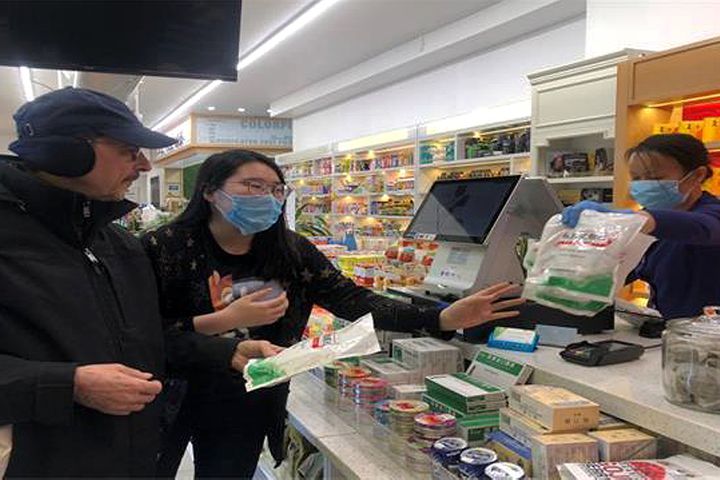 China's Herbal Medicine Exports Jump After Use on Covid-19 Patients
China's Herbal Medicine Exports Jump After Use on Covid-19 Patients(Yicai Global) April 2 -- Exports of traditional Chinese medicine are on the rise as people living outside China, particularly overseas Chinese, scramble to get their hands on herbal preparations that can help stave off the novel coronavirus.
China has been using its traditional medicine in the fight against Covid-19 extensively. Some 74,187 people, or 91.5 percent, of all China's confirmed cases have used Chinese medicine as part of their treatment, according to data released by the National Administration of Traditional Chinese Medicine on March 23.
Demand for Banlangen granules in the US and other foreign countries has soared since Covid-19 broke out, the head of Hutchison Whampoa Guangzhou Baiyunshan Chinese Medicine, the biggest supplier of the drug in China, told Yicai Global.
Banlangen, taken from the root of the Radix Isatidis plant, is a Chinese household cure for countering the symptoms of the common cold such as sore throat and inflamed nasal passages. In Chinese medical terms, it is effective in clearing heat and removing toxins and was first mentioned by the herbalist Li Shizhen in his Compendium of Materia Medica written in the 16th century.
Some drugstores have run out of stock, Hutchison Baiyunshan said. The Guangzhou-based firm is working against the clock to produce more for export, but the production cycle is long and overseas deliveries are slow.
Xiangxue Pharmaceutical's exports of anti-viral drugs have jumped 10-fold, Chairman Wang Yonghui told Yicai Global. When the outbreak first began, the company started production of prophylactic herbal teas using a prescription issued by the Guangzhou TCM Expert Team for Covid-19 Prevention and Control, Wang said. The firm is now receiving more orders than it can handle from abroad.
Xiangxue has also changed the form of its products from liquid to granules so that they are easier to transport, he added. Many buyers are now willing to pay for air freight, when previously that was rare due to the high cost.
Shijiazhuang Yiling Pharmaceutical's Lianhuaqingwen capsules, which have anti-viral and anti-inflammatory properties, were included on the National Health Commission's list of recommended Covid-19 treatments in February.
While Lianhuaqingwen still only accounts for a small fraction of the firm's total exports, overseas demand has been on the increase recently, an employee at the Shijiazhuang, Hebei province-based firm told Yicai Global.
Certification Difficulties
It is difficult for Chinese patent drugs to enter overseas markets because, due to a different medical theory, they do not meet the pharmacology and toxicology testing standards required for international certification, Wang said.
Western science stipulates that each medicine should have a clear chemical composition, and that the effect of the interactions of each chemical component on the efficacy and toxicity of the treatment must be specified.
Chinese medicine, however, usually involves a mix of herbal ingredients that are built around a specific prescription according to the individual. Its chemical composition is not fully transparent nor can its pharmacodynamic effects be completely determined. Just USD3.9 billion worth of Chinese medicine was exported in 2018.
Xiangxue has developed a smart Chinese medicine dispensing system using Big Data and artificial intelligence technologies that can receive prescriptions from hospitals and instantly set about preparing them. The Guangzhou-based firm serves up 60,000 individually prepared herbal decoctions to patients every day in Wuhan.
"We can extend this service worldwide to process prescriptions in Chinese medical clinics abroad," Wang said. Xiangxue believes that the overseas development of Chinese medicine should focus on personalized medical treatment.
Chinese medicine gained worldwide recognition for its role in fighting Severe Acute Respiratory Syndrome, or SARS, 17 years ago, Hu Ruilian, vice chairman of the China Association of Enterprises with Foreign Investment, told Yicai Global. Since SARS, however, the world has turned its attention away from traditional medicine. May be the same will happen after this pandemic, Hu added.
Editors: Liao Shumin, Chen Juan, Kim Taylor